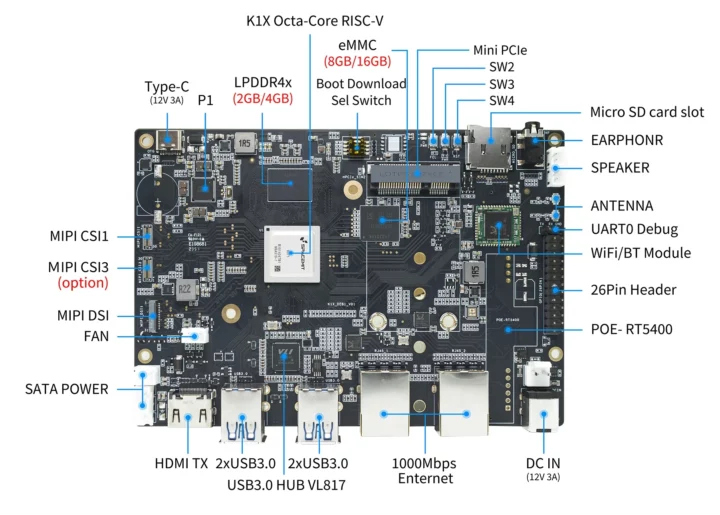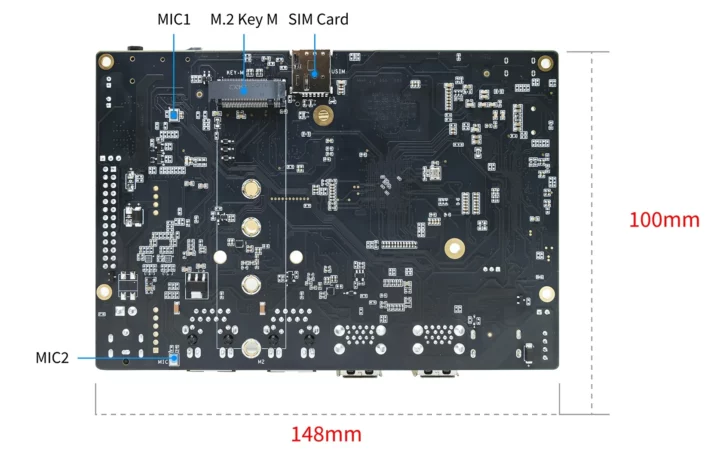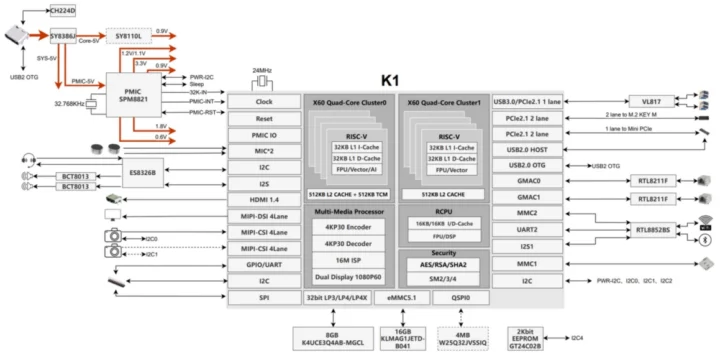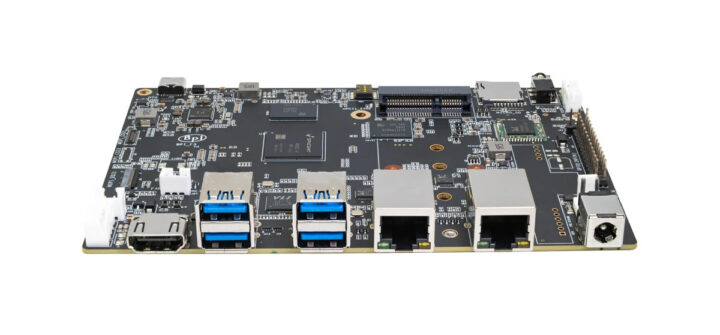Banana Pi BPI-F3 single board computer (SBC) is powered by the same SpacemiIT K1 octa-core 64-bit RISC-V SoC with 2TOP AI accelerator found in the upcoming Muse Book RISC-V laptop.
The board comes with up to 4GB RAM and 16GB eMMC flash, supports NVMe or SATA storage via its M.2 socket, is equipped with HDMI and MIPI DSI display interfaces, two MPI CSI camera interfaces, two gigabit Ethernet ports, a WiFi 5 and Bluetooth 4.2 module, and can also take a PCIe module for 4G LTE cellular connectivity. Other features include four USB 3.0 Type-C ports, a microSD card slot, a 26-pin GPIO header, and optional support for PoE.
Banana Pi BPI-F3 specifications:
- SoC – SpacemiT K1
- CPU – 8-core X60 RISC-V processor with single-core performance equivalent to about 1.3x the performance of an Arm Cortex-A55
- GPU – Imagination IMG BXE-2-32 with support for OpenCL 3.0, OpenGL ES3.2, Vulkan 1.2
- VPU – H.265, H.264, VP9, VP8 4K encoding/encoding
- NPU – 2.0 TOPS AI accelerator
- System Memory – 2GB or 4GB LPDDR4 (Note: The K1 SoC supports up to 16GB)
- Storage
- 8GB or 16GB eMMC flash
- MicroSD card slot
- Optional 32M SPI NAND flash
- Optional 4M SPI NOR flash
- Optional SATA port (via M.2 module)
- Display Interfaces
- HDMI 1.4 up to 1080p60
- 4-lane MIPI DSI connector
- Audio – Speaker header, onboard stereo microphone, 3.5mm headphone jack, digital audio via HDMI
- Camera – 2x 4-lane MIPI-CSI connectors
- Networking
- 2x Gigabit Ethernet RJ45 ports via Realtek RTL8211F transceivers; support for PoE via RT5400 expansion board
- Dual-band 2.4GHz/5GHz WiFi 5 and Bluetooth 4.2 via Realtek RTL8852BS module
- Optional 4G LTE via mPCIe socket and SIM card slot
- USB
- 4x USB 3.0 Type-A ports via VL817 USB 3.0 hub (so bandwidth is shared, also see block diagram below)
- 1x USB 2.0 Type-C OTG port
- Expansion
- M.2 Key-M socket (PCIe 2.1 x2); supports JMB582 SATA expansion card
- mPCIe socket (PCIE 2.1 x1)
- 26-pin header GPIO header
- Debugging – 3-pin UART connector
- Misc
- Reset, Power, and Burn buttons
- IR receiver
- Power LED
- DIP switch for boot selection
- Fan header
- Power Supply – 12V/3A via DC jack or USB Type-C port (strangely placed at opposite corners of the board)
- Dimensions – 148×100 mm
- Weight – 200 grams

 Banana Pi provides a Linux BSP with pi-opensbi RISC-V Open Source Supervisor Binary Interface, U-boot 2022.10, Linux 6.1.15, and an Armbian 24.04 build script. “Bianbu” NAS/Desktop images based on the Debian distribution and optimized to run on the SpacemiT K1 SoC can also be downloaded directly as well as unofficial Armbian images based on Ubuntu 24.04 Noble, Ubuntu 24.11 Mantic, or Ubuntu 22.04 Jammy.
Banana Pi provides a Linux BSP with pi-opensbi RISC-V Open Source Supervisor Binary Interface, U-boot 2022.10, Linux 6.1.15, and an Armbian 24.04 build script. “Bianbu” NAS/Desktop images based on the Debian distribution and optimized to run on the SpacemiT K1 SoC can also be downloaded directly as well as unofficial Armbian images based on Ubuntu 24.04 Noble, Ubuntu 24.11 Mantic, or Ubuntu 22.04 Jammy.
You’ll find all these resources, PDF schematics, and DXF files on the documentation website which looks better than before (aesthetically speaking), but don’t worry, it still has a few errors here and there as per the long-established tradition for Banana Pi boards. Banana Pi says the BPI-F3 SBC – and the SpacemiT K1 SoC in general – can be used for NAS, laptops, smart robotics, industrial control, edge AI computing, and more.

Banana Pi sells the 4GB/16GB variants of the BPI-F3 single board computer on Aliexpress for $73.69 plus shipping, and the 2GB/8GB model is listed for $63.16 but is currently out of stock. The RISC-V SBC can also be found on Amazon for $89 (4GB/16GB model). The BPI-F3 will be a cheaper platform for evaluation than the complete Muse Book laptop since the software maturity of the RISC-V ecosystem is still something to consider although it has progressed a lot in recent years.
Banana Pi uploaded a few videos on YouTube showing the SBC in action, including the one below with nine Full HD videos playing simultaneously while drawing about 12 Watts of power.

Jean-Luc started CNX Software in 2010 as a part-time endeavor, before quitting his job as a software engineering manager, and starting to write daily news, and reviews full time later in 2011.
Support CNX Software! Donate via cryptocurrencies, become a Patron on Patreon, or purchase goods on Amazon or Aliexpress







I am interested in the hopefully upcomming benchmark results here to be able to compare the speed before ordering
https://github.com/ThomasKaiser/sbc-bench/issues/93
on diagram mini pcie described as 2 lane 2.1
on images – 1 lane 2.1
It’s a pity it doesn’t come with the OS pre-installed, like the LicheePi 4A does.
If this is really SpacemiT K1 – then it should be:
GPU: IMG BXE-2-32
I can see it now. I’ve updated the specs.
Any faster than the visionfive 2?
yes, its 8 cores… but the gpu seems “smaller”… am i right ?
3A max is not bad!
I have just received. Installed Bainbu provided by bananapi. ( Ubuntu 23.10 with gnome 45.0 )
First impression. Very slow gpu. Maybe driver issue. Gnome is to heavy for that device. Cpu custom core X60. They said its 30% faster than cortex-A55. overrated. I need to do some benchmarking. But it might be something like cortex-A53.
There seems to be something wrong with DRAM initialization right now.
I’m using the Banana Pi BPI-F3 SpacemiT K1 8 Core RISC-V, with Armbian, and it works great. Including the Risc-V Vector 1.0 (RVV): it works
At least: as a server without GUI. The GUI stuff is absolutly unusable.
Christopher Barnatt posted a video on his Explaining Computers YouTube channel yesterday. It shows Bianbu (a Debian based OS) running on the Banana Pi BPI-F3.
It would seem to me to be a consumer-grade PC…
– It has LibreOffice, a Web browser and an email client,
– It didn’t seem particularly sluggish,
– And he said it had been very stable.